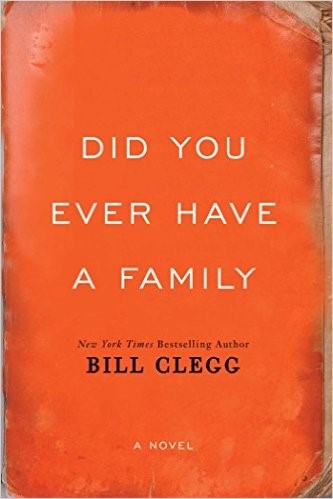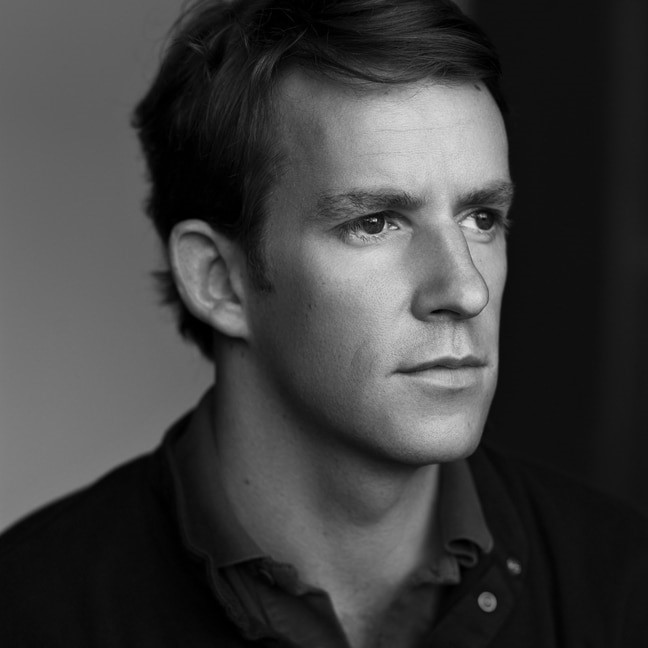
It never ceases to surprise me when I reach out to an author to share about their book with my audience and they respond. Today’s author is no exception and he was so fantastic in this interview that I am anxious to now check out his memoirs and read more about him in a more personal way.
For now, I will just have to be content informing you that Did You Ever Have a Family is Bill Clegg’s first fictional book and it is absolutely incredible and worthy of the Amazon Best Book of September 2015 nod as well as being longlisted for the Man Booker Prize. Can you imagine what a thrill that is for your first piece of fiction?
Oh, and did I mention he is a literary agent representing really incredible talent like Lauren Groff?
Yeah. Kind of a big deal.
And so is this book.

On the eve of her daughter’s wedding, June Reid’s life is completely devastated when a shocking disaster takes the lives of her daughter, her daughter’s fiancé, her ex-husband, and her boyfriend, Luke—her entire family, all gone in a moment. And June is the only survivor.
Alone and directionless, June drives across the country, away from her small Connecticut town. In her wake, a community emerges, weaving a beautiful and surprising web of connections through shared heartbreak.
Clegg ambitiously illuminates how interwoven we are as people in this beautiful and haunting story of a town tragedy and the people left behind. Although the sheer amount of characters that share in each of the chapters (some once, other main characters more often) is confusing to piece together as a reader, you become a detective as each person is woven into another. The grief-stricken mothers left behind leave you with an ache in your own heart and are written so beautifully they feel real. You are also reminded that even in chance meetings with others you can play a powerful part in someone else’s story. This is one of the best books I have read this year!
I gave this book 5 stars in our September Must-Reads list!
Now grab your coffee and let’s settle in with Bill Clegg to learn how he managed to orchestrate a town filled with so many characters to build his story!

Congratulations on your book being longlisted for the Man Booker Prize! How did you find out the news of this and have you done anything to celebrate yet?
My British editor emailed me and I didn’t tell anyone until the next day. It seemed too unreal to be true. I needed to let a night pass to make sure I hadn’t made it up.
Your book has a very “old soul,” feel to it and builds upon the heartache and despair of a senseless tragedy. After I finished the book, I looked you up and expected a man twice your age to have been the author! I know that you have documented your difficulties with addiction in your first two books (Portrait of an Addict as a Young Man & Ninety Days). Do you feel you were able to channel some of your own struggles through this story because of what has happened in your own life? Which of the characters did you relate most to?
In the seven years I was writing the book no one close to me had died so the grief of that loss was only something I could imagine into. Weeks before the book came out my father died and he’d not been well for a few years so much of the last year of writing was informed by my fear of losing him. The loss of friends, career, esteem, and love from drug and alcohol addiction, and the slow progression after – from grief and regret to acceptance and forgiveness – this I know as it’s marked the last eleven years of my life and is ongoing and always. The characters in Did You Ever Have A Family are all in their own way – first alone and then less so – somewhere in this process, making their way. I relate to all of them. And the more time I spent with them, the more fully I understood them, the closer I felt to their experience. This tends to be my experience of people in real life, too. The more I know someone, no matter how seemingly different they seem (race, age, economics, politics) it never fails to amaze me how much more in common there is between us than not.
Your story begins with a tragedy and then works its way out, giving your reader a chance to play detective as more of the mystery of those lost is uncovered. In that way, it reminded me of Everything I Never Told You, starting with the loss and developing it out from there. Why did you structure your story this way for the reader?
Further to this idea of getting to know people and over time unraveling who and how and why they are I liked the idea of arriving at a set of characters all stepping out and away from moment in time – in this case a tragic accident – and while tracing how they navigate that terrain excavating the years that preceded it. In a way the accident could have been anything – a Christmas morning, a high school graduation, a lunar eclipse. But once my brother, who was in heating and plumbing school at the time, began telling me stories about propane leaks and house explosions, I was spellbound and the occasion for the novel fixed.
The amount of characters you juggled in this story was quite astounding, with many characters only lingering for a single chapter. I picture you in your office writing this with a town map and a family tree to try and keep everyone straight! Did you map out the characters first and then build your story from there or did they just come to you as you wrote? Which voice was your favorite to write?
There was no map or family tree or chart as I was writing it. I think if I had to reckon with how many characters I’d created I would have panicked. So I plowed ahead and the book swelled to gargantuan proportions and once I had a draft I began to winnow it down to just the core characters of June, Lydia and Silas and then the voice from the communities they live in, leave and enter. It was painful to let go of some of them but it was clear which voices mattered to the novel. There was one point late in that process when I printed up the manuscript and laid out each chapter in order on a long window seat in my living room. Seeing it as an object – each character labeled in big black ink on the first page – helped guide me through a final ordering.
I understand that it took you seven years to write this book! Did you ever reach a point where you just wanted to give up on the story? What motivates you to continue when a book takes so much time to develop?
Many times. Many corners I painted myself into. Sleep, another day, a long walk in the woods, music, months of not writing – these were what I turned to in order to find a way forward. One thing that kept me going was knowing (what I thought for a long while was) the final scene and the last words of the book. I just had no idea how to get there! But having a destination helped even if for a long time there was no road or map.
As a literary agent, what has this process been like being the writer? Has this process changed you in any way now as you deal with the writers you work with now that you have been on the other end?
The vulnerability that comes with fiction came as a surprise. The memoirs were frank and exposing and it was hard to imagine being more vulnerable than that, but there is something about creating a story from scratch and sending it into the world to be judged that makes for a naked feeling I didn’t count on.

One of my favorite passages in your story is the beautiful analogy of life and the Ferris Wheel. In it you say, “June hears them laughing just outside the house and thinks, with a loose knot of nostalgia and envy, that this moment in their relationship, in their lives, is as good as it will ever get. The before. The top of the Ferris wheel…This is the pivot between youth and age, the thrilling place where everything seems visible, feels possible, where plans are made. On the one side you have childhood and adolescence, which are the murky ascent, and on the other, you have the decline that is adulthood, old age, the inch-by-inch reckoning of that grand brief vision with earthbound reality.” I don’t have any questions about this, I just wanted you to know that this passage really spoke to me. This idea of our life being like a Ferris wheel is so achingly beautiful.
Oh to be back at the top! I think the truth of the top is that we only ever see it clearly until we inch down from its peak, seeing we had been there and didn’t know where we’d been and what we had, briefly.
If you could tell anyone to read one book (other than your own) what would that book be (we list it with all the recommendations over the year HERE)?
SWIMMING by Nicola Keegan.
By my lights one of the most brilliant, moving and devastatingly funny stories about growing up alongside, coping with and surviving the people who raise us. The voice is so strong, so piercing and so authentic. I’ve never read anything that conveyed more powerfully how families can be both curse and windfall. I think about that book all the time.
Pin It